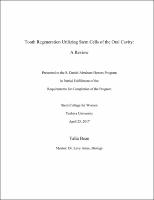Please use this identifier to cite or link to this item:
https://hdl.handle.net/20.500.12202/4234| Title: | Tooth Regeneration Utilizing Stem Cells of the Oral Cavity: A Review |
| Authors: | Bean, Talia |
| Keywords: | Dentistry. Tissue engineering. Stem cells. |
| Issue Date: | Apr-2017 |
| Publisher: | Stern College for Women |
| Abstract: | The concept that teeth contain stem cells is obvious based on their continued development into adulthood, as well as the restorative ability of dentin. Seven types of dental stem cells have been isolated and identified, and each is undergoing continued investigation to reveal their full capabilities. These stem cells include (1) DPSC’s (dental pulp stem cells), (2) SHED (stem cells from human exfoliated deciduous teeth), (3) PDLSCs (periodontal ligament stem cells), (4) SCAP (stem cells from root apical papilla), (5) DFPC’s (dental follicle precursor cells), (6) GMSCs (gingiva-derived mesenchymal stem cells), and (7) hOMSCs (human oral mucosa stem cells). Attempts to bioengineer a functional tooth have been made, some utilizing embryonic stem cells as well as dental stem cells in the process. A less controversial approach employs dental stem cells applied in a controlled microenvironment, often provided by a seeded scaffold. The appropriate growth factors and other molecules induce differentiation of the stem cells along the proper cell lineages. New advances in scaffold technologies provide novel opportunities for creating a fully functioning bio-tooth. Before this lofty goal can be reached, stem cell therapy and application should be explored as a viable alternative to common dental procedures such as fillings, root canals, and treatment of gum disease. |
| Description: | The file is restricted for YU community access only. |
| URI: | https://hdl.handle.net/20.500.12202/4234 https://ezproxy.yu.edu/login?url=https://repository.yu.edu/handle/20.500.12202/4234 |
| Appears in Collections: | S. Daniel Abraham Honors Student Theses |
Files in This Item:
| File | Description | Size | Format | |
|---|---|---|---|---|
| Talia-Bean.pdf Restricted Access | 436.77 kB | Adobe PDF |  View/Open |
This item is licensed under a Creative Commons License

